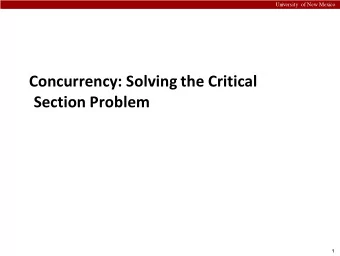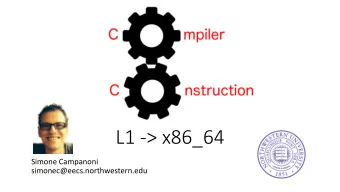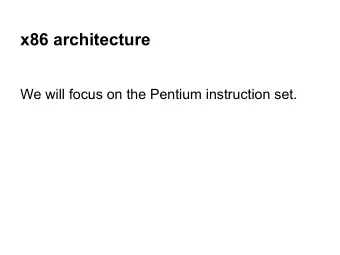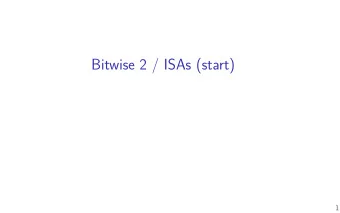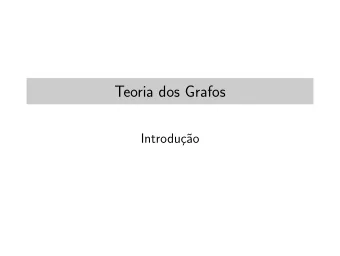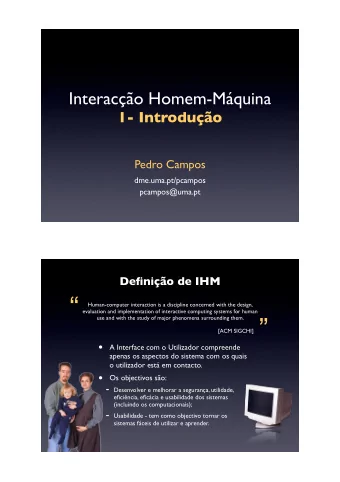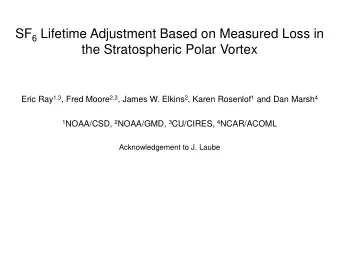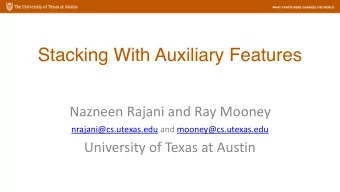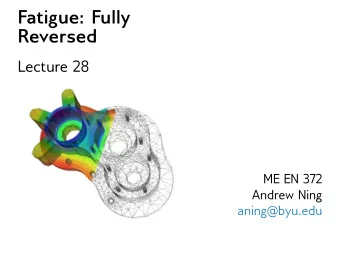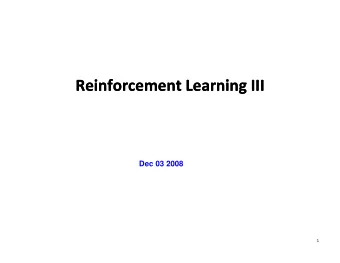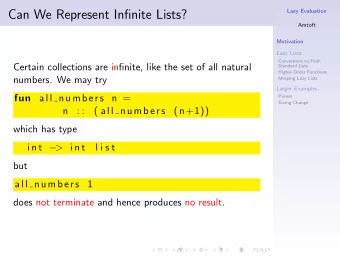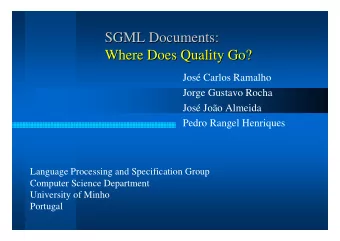
What? Discrimination is a generalization of sorting and partitioning - PowerPoint PPT Presentation
Discrimination is Wrong And What We Can Do About It Edward Kmett What? Discrimination is a generalization of sorting and partitioning that can be defined generically by structural recursion. Radix / American Flag Sort for algebraic data
Discrimination is Wrong And What We Can Do About It Edward Kmett
What? • Discrimination is a generalization of sorting and partitioning that can be defined generically by structural recursion. • Radix / American Flag Sort for algebraic data types. • It breaks the classic comparison-based Θ (n log n) bound by not working with mere pair-wise comparisons, but extracting more structure.
Why? • “You can do almost everything in linear time” • Where everything includes: • Sorting • Partitioning • Joining Tables • Constructing Maps and Sets.
Who? • Fritz Henglein Where? • Director of HIPERFIT Research Center • Professor at Univ. of Copenhagen
When? A bunch of papers and talks from 2007-2013: 2011 Generic multiset programming with discrimination-based joins and symbolic Cartesian products • 2010 Generic Top-down Discrimination for Sorting and Partitioning in Linear Time • 2009 Generic Top-down Discrimination • 2007 Generic Discrimination Sorting and Partitioning Unshared Data in Linear Time •
Building a Nice API
“ Monads are Monoids in the Category of Endofunctors. What is the Problem?” –Stereotypical Haskell Programmer
Monoids class Monoid m where mappend :: m -> m -> m mempty :: m
Monoidal Categories A monoidal category (C, ⨂ ,I) is a category C equipped with: • a bifunctor ( ⨂ ) :: C * C -> C • an object I :: C • and natural isomorphisms • ρ :: (A ⨂ I) ~ A • λ :: (I ⨂ A) ~ A • α :: (A ⨂ B) ⨂ C ~ A ⨂ (B ⨂ C)
Products Hask is a category with types as objects and functions as arrows. (Hask, (,) , () ) is a monoidal category with: • ρ = fst :: (a,()) -> a • ρ -1 = \a -> (a, ()) • λ = snd :: ((), a) -> a • λ -1 = \a -> ((), a) • α :: ((a,b),c) -> (a,(b,c))
Products and Coproducts (Hask, (,) , () ) is a monoidal category with: • ρ = fst :: (a, ()) -> a • ρ -1 = \a -> (a, ()) • λ = snd :: ((), a) -> a • λ -1 = \a -> ((), a) • α :: ((a,b),c) -> (a,(b,c)) (Hask, (+) , Void ) is a monoidal category with: • ρ = (\(Left a) -> a) :: a + Void -> a • ρ -1 = Left • λ = (\(Right a) -> a) :: Void + a -> a • λ -1 = Right • α ::(a + b) + c -> a + (b + c)
Functor Composition Hask Hask is a category with functors as objects and natural transformations as arrows. type a ~> b = forall i. a i -> b i (Hask Hask , Compose , Identity ) is a monoidal category with: • ρ :: Compose a Identity ~> a • ρ = fmap runIdentity . getCompose • ρ -1 = Compose . fmap Identity • α :: Compose (Compose a b) c ~> Compose a (Compose b c)
Monoid Objects A monoid object in a monoidal category (C, ⨂ ,I) consists of • a carrier object M • η :: I -> M • μ :: M ⨂ M -> M such that:
Monoids as Monoid Objects A monoid object in (Hask, (,) , () ) is an object M with η :: () -> M η () = mempty μ :: (M,M) -> M μ = uncurry mappend such that the Monoid laws hold.
Monads as Monoid Objects Hask , Compose,Identity ) is a Functor A monoid object in (Hask M with η :: Identity ~> M η = return . runIdentity μ :: Compose M M ~> M μ = join . getCompose such that the monad laws hold.
Day Convolution from (<*>) data Day f g a where Day :: f (a -> b) -> g a -> Day f g b (<*>) :: Applicative f => f (a -> b) -> f a -> f b Day (<*>) :: Day f f ~> f
Applicatives as Monoid Objects Hask , Day,Identity ) is a Functor M A monoid object in (Hask with η :: Identity ~> M η = pure . runIdentity μ :: Day M M ~> M μ (Day m n) = m <*> n such that the Applicative laws hold on M.
“ Applicatives are Monoids in the Category of Endofunctors. What is the Problem?” –Me
Day Convolution from liftA2 Covariant Day Convolution: data Day f g a where Day :: ((a ⨂ 1 b) -> c) ⨂ 2 f a ⨂ 2 g b -> Day f g c Contravariant Day Convolution: data Day f g a where Day :: (c -> (a ⨂ 1 b)) ⨂ 2 f a ⨂ 2 g b -> Day f g c
Is There a Contravariant ______?
Monad Is There a Contravariant ______? No
Comonad Is There a Contravariant ______? No
Is There a Contravariant ______? Applicative Yes!
Divide and Conquer class Contravariant f => Divisible f where divide :: (a -> (b, c)) -> f b -> f c -> f a conquer :: f a comes from contravariant Day Convolution: data Day f g a where Day :: (c -> (a ⨂ 1 b)) ⨂ 2 f a ⨂ 2 g b -> Day f g c with ⨂ 1 = (,) ⨂ 2 = (,)
Divide and Conquer w/ Some Laws class Contravariant f => Divisible f where divide :: (a -> (b, c)) -> f b -> f c -> f a conquer :: f a delta a = (a,a) divide delta m conquer = m divide delta conquer m = m divide delta (divide delta m n) o = divide delta m (divide delta n o)
Divide and Conquer w/ Real Laws class Contravariant f => Divisible f where divide :: (a -> (b, c)) -> f b -> f c -> f a conquer :: f a divide f m conquer = contramap (fst . f) m divide f conquer m = contramap (snd . f) m divide f (divide g m n) o = divide f' m (divide id n o) where f' a = case f a of (bc,d) -> case g bc of (b,c) -> (a,(b,c))
Choose and Lose class Divisible f => Decidable f where choose :: (a -> Either b c) -> f b -> f c -> f a lose :: (a -> Void) -> f a comes from contravariant Day Convolution: data Day f g a where Day :: (c -> (a ⨂ 1 b)) ⨂ 2 f a ⨂ 2 g b -> Day f g c with ⨂ 1 = Either ⨂ 2 = (,) * The superclass constraint comes from Hask being a distributive category.
Choose and Lose class Contravariant f where contramap :: (a -> b) -> f b -> f a class Contravariant f => Divisible f where divide :: (a -> (b, c)) -> f b -> f c -> f a conquer :: f a class Divisible f => Decidable f where choose :: (a -> Either b c) -> f b -> f c -> f a lose :: (a -> Void) -> f a
Why is there an argument to lose ? pureish :: Applicative f => (() -> a) -> f a emptyish :: Alternative f => (Void -> a) -> f a conquerish :: Divisible f => (a -> ()) -> f a lose :: Decidable f => (a -> Void) -> f a pure a = pureish (const a) empty = emptyish absurd conquer = conquerish (const ())
Predicates newtype Predicate a = Predicate { getPredicate :: a -> Bool } instance Contravariant Predicate where contramap f (Predicate g) = Predicate (g . f) instance Divisible Predicate where divide f (Predicate g) (Predicate h) = Predicate $ \a -> case f a of (b, c) -> g b && h c conquer = Predicate $ const True instance Decidable Predicate where lose f = Predicate $ \a -> absurd (f a) choose f (Predicate g) (Predicate h) = Predicate $ either g h . f
Op newtype Op r a = Op { getOp :: a -> r } instance Contravariant (Op r) where contramap f (Op g) = Op (g . f) instance Monoid r => Divisible (Op r) where divide f (Op g) (Op h) = Op $ \a -> case f a of (b, c) -> g b <> h c conquer = Op $ const mempty instance Monoid r => Decidable (Op r) where lose f = Op $ \a -> absurd (f a) choose f (Op g) (Op h) = Op $ either g h . f
Equivalence Classes newtype Equivalence a = Equivalence { getEquivalence :: a -> a -> Bool } instance Contravariant Equivalence where contramap f g = Equivalence $ on (getEquivalence g) f instance Divisible Equivalence where divide f (Equivalence g) (Equivalence h) = Equivalence $ \a b -> case f a of (a',a'') -> case f b of (b',b'') -> g a' b' && h a'' b'' conquer = Equivalence $ \_ _ -> True instance Decidable Equivalence where lose f = Equivalence $ \a -> absurd (f a) choose f (Equivalence g) (Equivalence h) = Equivalence $ \a b -> case f a of Left c -> case f b of Left d -> g c d Right{} -> False Right c -> case f b of Left{} -> False Right d -> h c d
Comparisons newtype Comparison a = Comparison { getComparison :: a -> a -> Ordering } instance Contravariant Comparison where contramap f g = Comparison $ on (getComparison g) f instance Divisible Comparison where divide f (Comparison g) (Comparison h) = Comparison $ \a b -> case f a of (a',a'') -> case f b of (b',b'') -> g a' b' <> h a'' b'' conquer = Comparison $ \_ _ -> EQ instance Decidable Comparison where lose f = Comparison $ \a _ -> absurd (f a) choose f (Comparison g) (Comparison h) = Comparison $ \a b -> case f a of Left c -> case f b of Left d -> g c d Right{} -> LT Right c -> case f b of Left{} -> GT Right d -> h c d
Deciding with Generics class GDeciding q t where gdeciding :: Decidable f => p q -> (forall b. q b => f b) -> f (t a) instance (GDeciding q f, GDeciding q g) => GDeciding q (f :*: g) where gdeciding p q = divide (\(a :*: b) -> (a, b)) (gdeciding p q) (gdeciding p q) instance GDeciding q U1 where gdeciding _ _ = conquer instance (GDeciding q f, GDeciding q g) => GDeciding q (f :+: g) where gdeciding p q = choose (\ xs -> case xs of L1 a -> Left a; R1 a -> Right a) (gdeciding p q) (gdeciding p q) instance GDeciding q V1 where gdeciding _ _ = lose (\ !_ -> error “impossible")
Recommend
More recommend
Explore More Topics
Stay informed with curated content and fresh updates.
